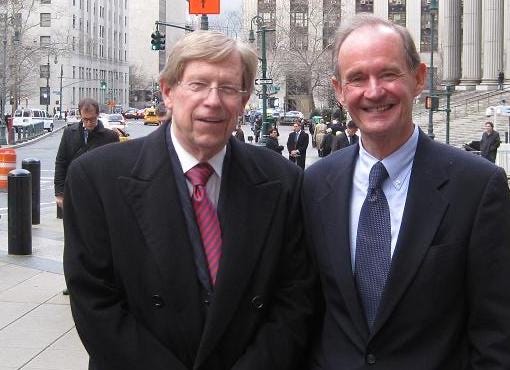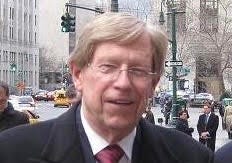In Memoriam: Theodore ‘Ted’ Olson (1940-2024)
The former U.S. solicitor general and longtime Gibson Dunn partner devoted his life and legal career to liberty, equality, and the rule of law.

Welcome to Original Jurisdiction, the latest legal publication by me, David Lat. You can learn more about Original Jurisdiction by reading its About page, and you can email me at davidlat@substack.com. This is a reader-supported publication; you can subscribe by clicking here.
Theodore “Ted” Olson, the renowned Supreme Court and appellate advocate, passed away on November 13 at the age of 84. The cause was a stroke, according to his wife, Lady Booth Olson. Obituaries ran in The New York Times, The Washington Post, Bloomberg Law, The American Lawyer, Law360, Reuters, and The Free Press.
His death was announced by his longtime law firm, Gibson Dunn & Crutcher. Chair and managing partner Barbara Becker said, “Ted was a titan of the legal profession and one of the most extraordinary and eloquent advocates of our time. He was creative, principled, and fearless—a trailblazing advocate who cared about all people. We mourn his loss profoundly and send our condolences to his wife Lady, a cherished member of our firm family, and to all of Ted’s loved ones.”
After graduating from Berkeley Law in 1965, Olson joined Gibson Dunn, where he spent most of his entire six-decade legal career. He founded the firm’s appellate and constitutional-law practice, which he helped turn into the powerhouse that it is today, and also became well-known for his First Amendment expertise.
A prominent conservative lawyer, Olson spent two stints away from Gibson, engaged in government service at the highest levels. From 1981 to 1984, he served as assistant attorney general overseeing the Office of Legal Counsel at the U.S. Department of Justice. He advised the Reagan administration on critical issues of executive power and also advanced Republican policy priorities, such as fighting racial preferences and excessive government regulation.
From 2001 to 2004, Olson served as U.S. solicitor general, the federal government’s top lawyer before the Supreme Court. Widely regarded as one of the finest SCOTUS advocates of his time—and, for that matter, of all time—he ultimately argued before the high court on 65 occasions, in both government and private practice.
He was appointed solicitor general by President George W. Bush, whom Olson represented in one of his most famous cases: Bush v. Gore, in which the Supreme Court issued a controversial ruling that resolved the disputed 2000 election in Bush’s favor. His opponent in that case was a legendary liberal lawyer, David Boies.
The Bush v. Gore adversaries became allies in Olson’s second most-famous case: Hollingsworth v. Perry (2013), which he regarded as his greatest legal legacy. In 2009, Olson and Boies led a legal team that filed a constitutional challenge to Proposition 8, California’s ban on gay marriage. They prevailed in a bench trial before Chief Judge Vaughn Walker (N.D. Ill. Cal.), and the state of California decided not to appeal. But intervenors, including the official proponents of Prop 8, stepped in and took the case to the Ninth Circuit. Olson and Boies argued the appeal, again emerging victorious. [UPDATE (3:58 p.m.): Corrected Chief Judge Walker’s district—although he was born in Illinois, he headed west for law school at Stanford and spent the rest of his career in the San Francisco Bay Area.]
The proponents sought review from the U.S. Supreme Court. In an opinion by Chief Justice John Roberts, the Court held that the proponents lacked standing to appeal in the first place. The Court therefore vacated the Ninth Circuit opinion, making Judge Walker’s opinion the governing law—and effectively legalizing same-sex marriage in California. This helped pave the way for the Court’s ruling two years later in Obergefell v. Hodges (2015), which brought marriage equality to the entire nation. (Boies and Olson co-authored a book about the case, Redeeming the Dream: Proposition 8 and the Struggle for Marriage Equality.)
In addition to Bush v. Gore and Hollingsworth v. Perry, Olson successfully represented Citizens United in Citizens United v. Federal Election Commission (2010), the landmark First Amendment case allowing corporations to make unlimited independent expenditures on political speech—a precedent loathed by the left. But reflecting his intellectual independence, he also argued and won Department of Homeland Security v. Regents of the University of California (2020), in which the Court rejected the Trump administration’s attempt to rescind the Deferred Action for Childhood Arrivals (DACA) immigration program—a ruling supported by progressives.
Hard-core partisans might view these various stances as inconsistent, but there are actually clear through lines. As noted by Andrew Wolfson of The Washington Post, “What many of Olson’s arguments had in common was that they aligned with his libertarian brand of conservatism.” Or in the words of Joe Nocera—who became friends with Olson during the Prop 8 litigation that was also worked on by Nocera’s wife, Dawn Schneider—Olson “lived an exemplary life fighting for the things he believed in: free speech, equal rights, and the Constitution.”
Olson’s legal career boasted many triumphs, but his life was also marked by tragedy. On September 11, 2001, his wife Barbara Olson, a lawyer and conservative commentator, was killed when American Airlines Flight 77 was hijacked by Al Qaeda terrorists, who then crashed it into the Pentagon. Barbara had planned to fly out to Los Angeles (for a television appearance with Bill Maher) the day before, but stayed an extra day so she could be with Ted on the morning of his 61st birthday. She called him twice from the airplane: she reported what was happening on Flight 77, he told her about the other hijacked 9/11 planes, and they said their final farewells. His telephone from that morning is now in the collection of the Smithsonian.
Ted and Barbara were active in the Federalist Society, which is how I first met Ted. Back then, in my conservative days, I was vice president of the Yale Federalist Society, and I attended the annual barbecue they hosted at their home in Great Falls, Virginia, for leaders of FedSoc student chapters. The well-connected Olsons would also invite legal luminaries to their barbecues; at the one I attended in the summer of 1998, I got to meet Justice Clarence Thomas (and still have a photograph of me and Justice Clarence Thomas from the event, signed by the justice).
Ted served on the Federalist Society’s Board of Visitors, and over the years, I would sometimes reach out to him when writing about FedSoc. For example, I contacted him for my January 2021 story, The Federalist Society And The Capitol Attack: What Is To Be Done? At the time, voices both inside and outside FedSoc were criticizing the organization for not speaking out about the events of January 6—criticisms I was (and remain) sympathetic to. Ted reminded me that the Society itself does not take stances on issues, instead allowing its individual members to hold and articulate their own views. And this was something he appreciated firsthand: when he was litigating for marriage equality, some socially conservative members of FedSoc called upon the organization to condemn his work or to expel him, but the Society did neither.
The Federalist Society’s 2024 National Lawyers Convention begins today, and tomorrow night, Ted’s presence will be missed at the Barbara K. Olson Memorial Lecture, an annual lecture on limited government and the spirit of freedom. Ted delivered the inaugural Olson Lecture and attended in subsequent years, and I would try to say hello when I could, at either the lecture or the reception that followed. But it wasn’t always easy; Ted was a rock star at the Convention, constantly surrounded by a large group of well-wishers.
My favorite encounter with Ted took place in September 2015, when my husband Zach and I bumped into Ted and his wife Lady in the United Airlines lounge at LAX. Zach and I were on our way back to New York after our honeymoon in Australia—so it was the perfect opportunity to thank Ted for his years of work on behalf of marriage equality. He could not have been more gracious, saying that the four of us should have a celebratory dinner together when we were all back on the East Coast. (I wish I had taken a selfie of us, but I knew that Ted, not one to draw attention to himself, could be camera-shy; he initially demurred when I tried to take the photo that appears at the top of this post.)
As David Boies put it, “Ted Olson was a giant in the law, and a giant in life. He left the law, our country, and each of us better than he found us.” Theodore Bevry Olson, rest in peace.
Thanks for reading Original Jurisdiction, and thanks to my paid subscribers for making this publication possible. Subscribers get (1) access to Judicial Notice, my time-saving weekly roundup of the most notable news in the legal world; (2) additional stories reserved for paid subscribers; (3) transcripts of podcast interviews; and (4) the ability to comment on posts. You can email me at davidlat@substack.com with questions or comments, and you can share this post or subscribe using the buttons below.




Thank you David for your insightful and fascinating bio of Ted Olson .. Quite a legal giant and a man of great integrity ..
Ted was the lawyer and the human being you wanted to be but weren't. I was far down the totem pole of DOJ attorneys, but he always had time to swap stories. His death leaves an irreplaceable loss.